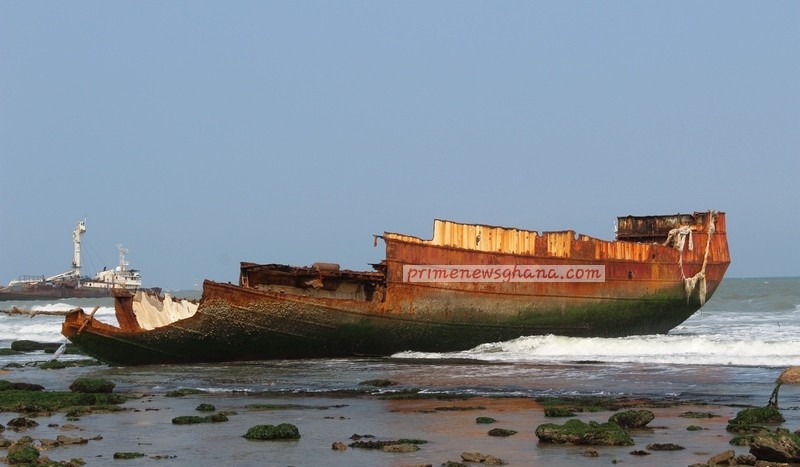It's a little after 3pm on a bright Saturday afternoon, and Nartey Kofi, 40, with three colleague fishermen are sat on the edge of an abandoned canoe stitching nets together.
He puts two of his right fingers in the mouth and whistles to a tourist, who had just made a splashy dive into the water, to be careful the direction he was swimming towards.
“One of our colleagues nearly lost his life after he was cut on the forehead by a buried metal from one of the abandoned ships,†he said in the local Dangbe dialect.
The abandoned ships, numbering more than four, have made it difficult for local fishermen to operate in the area for fear of their nets being destroyed. The fishermen say the ships have been there for more than two decades and despite complaints by their leaders to the authorities to stop the practice of leaving them at the shores, nothing has been done stop the practice.
“This very ship has been here for more than three decades if am not exaggerating,†he said to me, pointing to two of the ships whose parts have decayed into the water and could only be seen when the water recedes.

This ship has been in the water for over 3 decades, it can only be spotted when the waters recede
Residents from Kpoe Ete, a suburb in Prampram, say the ships have made it difficult for them to even enjoy the luxury of the water because of fear they may hurt themselves while swimming.
“How can you allow this much madness to happen at such a nice shore,†a tourist visiting Prampram said. “We have no respect for the environmental laws in this country and so anyone can get up and just throw these ships here knowing he will not be prosecuted or anything.â€
Less than 300 metres from where the fishermen were busy stitching their nets, a group of young men was seen moving in and out of a compound with mini trucks loaded with broken metals from a fenced compound overlooking the sea.
The workers on the site wouldn’t speak but the fishermen say the dismantled metals were from the ships.
“I am just a driver and cannot speak much about what happens here,†a gentleman wearing a white nose mask said, adding: “ The manager is not around to talk to so nobody will say anything.â€
Apart from threat to fishing operations for the local fish industry, the abandoned ships are equally creating environmental concerns for the residents and tourists alike.

These wrecks are a constant threat to fishermen
The rotten ship situation is part of the major problems Ghana is dealing with in trying to control the coming in of used computers and accessories from abroad. As it stands now, the country has become a hub for the dumping of these goods into the country and despite campaigns to get the situation stopped; very little success has been achieved.
The electronic waste site at Agbogbloshie at Old Fadam or Sodom and Gomorrah, which has become a dumping ground for the used electronic gadgets, remains economic hub for majority of unemployed youth in the country, who on daily basis defy the serious health implications to irk out a living, discarding parts of metals from dawn to dusk, despite the perils to their own lives. Â
Statistics from the United Nations University say about 41 million tons of e-waste worth over £34million were discarded globally in 2014 alone. Only six million tons, per the statistics, of the entire waste were recycled.  The United Kingdom alone contributed 1.5million tons of electronic waste out of 11.6million tons of e-waste discarded by Europe.
The polluted nature of the dump site remains a raging debate and countries suspected to have contributed to the mess, including Germany and other European countries, have contributed financially to measures that will lead to addressing the environmental impact. But that has not yielded many outcomes.

The fishermen are exposed to danger at times
An Act from parliament to streamline the operations at the site has been passed but has not resulted in any meaningful impact. Though it was to provide for the control, management and disposal of hazardous waste, electrical and electronic waste in the country, the waste situation continues to grow.
“The Act will also ensure that harmful elements associated with hazardous and other waste products are captured and processed safely to preserve critical ecological components such as the soil, groundwater, flora and fauna.
The passage of the Act is also in fulfillment of Ghana’s obligations under the Basel Convention on the Control of Transboundary Movement of Hazardous Waste, the Rotterdam Convention on Prior Informed Consent Procedure for Certain Hazardous Chemicals and Pesticides in International Trade as well as the Stockholm Convention on Persistent Organic Pollutants .â€
Â

The wrecks are a persistent source of pollution
Details of the Act also prohibits the importation, exportation, transportation, selling, purchasing or dealing in or depositing of hazardous waste or other waste on any land in the country or in the territorial waters of Ghana. It deals with hazardous waste and other waste and seeks to domesticate the Basel Convention on the Control of Transboundary Movement of hazardous Waste and their disposal, prescribes the Electrical and Electronic Waste levy and establishes a Fund as well as an Electronic Waste Recycling Plant.
Fisherman Nartey Kofi believes the current situation in Prampram needs to be tackled before it blows into something that “we cannot control.â€
For now, that part of the waters remains a no go area for the fishermen or anyone willing to swim due to the potential threats to life.
www.primenewsghana.com/Â GhanaNews





